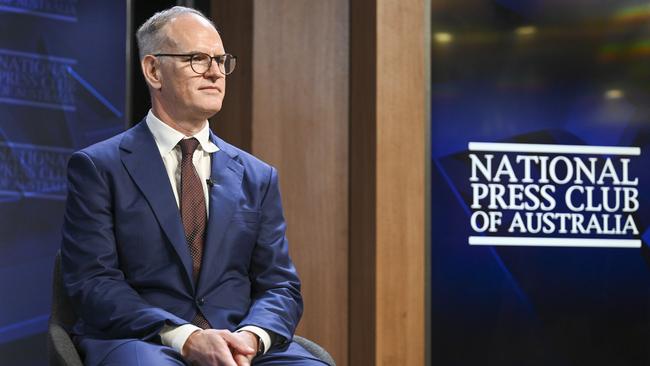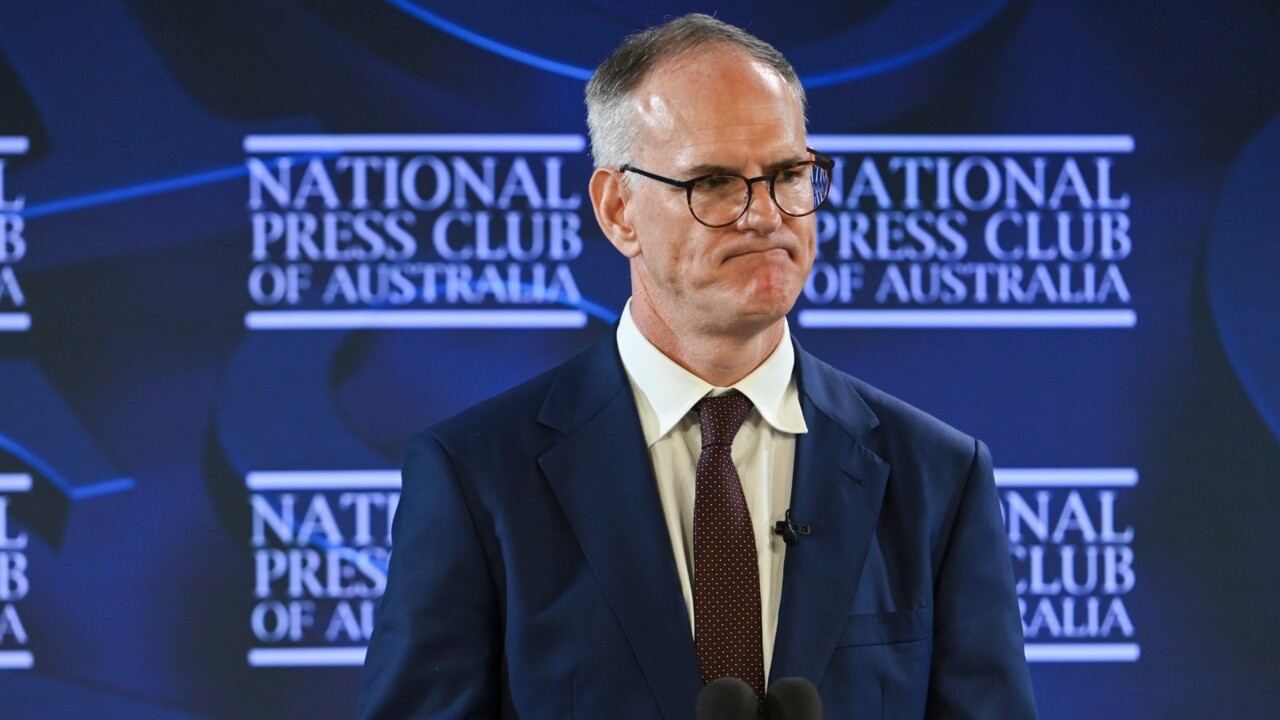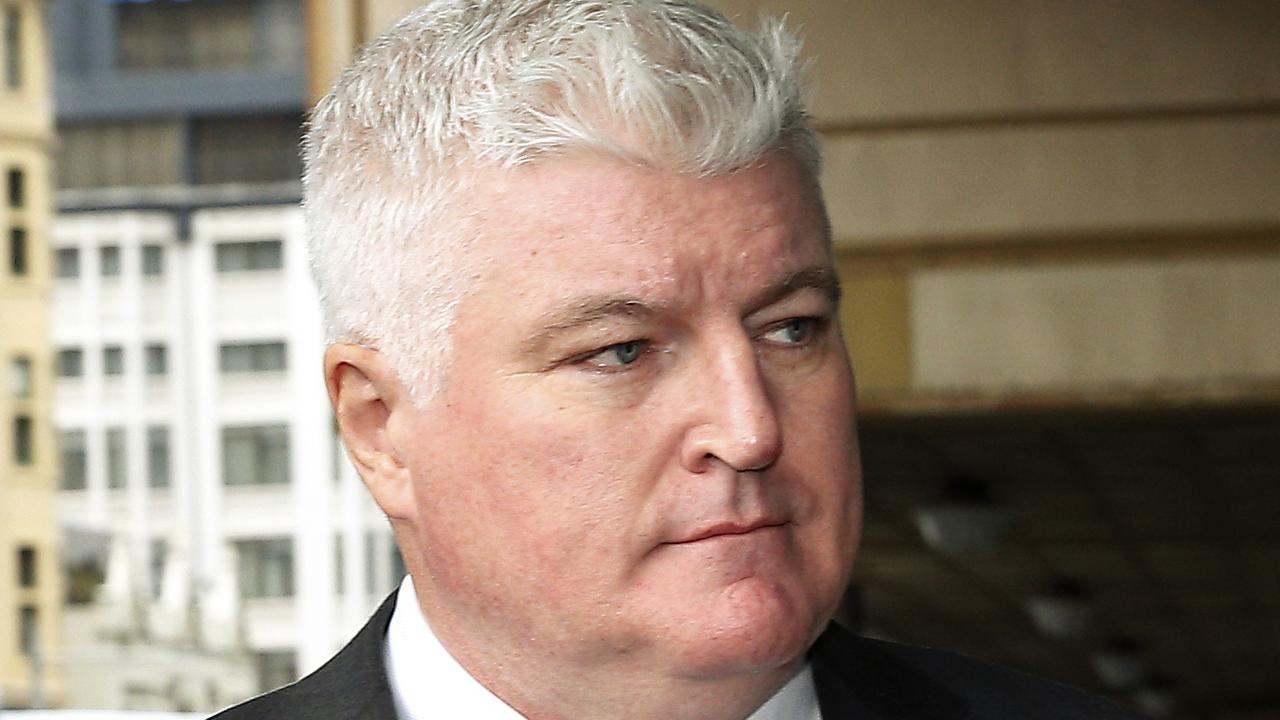News Corp Australasia executive chairman Michael Miller says tech giants should be blocked from Australia if they breach ‘social licence’ laws
News Corp Australasia executive chairman Michael Miller has outlined a sweeping new regime that he says tech monopolies should have to meet if they want to access Australian consumers.

Tech giants have been told to sign up to a suite of “social licence” laws offering better protection for Australians or leave the country, with demands they help fund mental healthcare under a sweeping social media overhaul.
Declaring “it’s time for them to play by our rules”, News Corp Australasia executive chairman Michael Miller proposed a series of laws tech giants should have to comply with if they want to access Australian consumers.
They could ultimately be blocked from operating in Australia if the laws were breached.
“The tech monopolies, especially social media networks such as Meta, TikTok and X, choose to operate outside our legal system,’’ Mr Miller said in an address to the National Press Club on Wednesday.
“In the space of just one generation, we have gone from magic to madness. Remember when we first discovered search – when we learned we could find out anything we wanted to know at the click of a button? Remember when our phones became smart? When we started sharing photographs and memories? Remember our first video calls with family we hadn’t seen for years?
“This was before online scams and blackmail; before cyber-bullying and revenge porn; before doxing and trolling, deep fakes and conspiracies; the surveillance economy and political interference; before terrorists live-streamed massacres; and sites celebrated anorexia as a glamorous lifestyle; before the epidemic of loneliness and anxiety; before the algorithms turned us into addicts.’’
Under the social licence plan, the federal government would be able to make the platforms liable for all content that is amplified, curated and controlled by them. “The licence should require that each platform has an effective consumer complaints handling system, including call centres contactable by telephone with expert staff in Australia,” Mr Miller said.

“Other measures to be included: The ex-ante competition framework set out by the ACCC which would address the problem of the monopolised digital advertising markets; a contribution to the money we are spending tackling mental health problems; a requirement for tech platforms proven to be the media’s unavoidable trading partners would be to honour the Media Bargaining Code and compensate publishers and media companies.
“Penalties should also be included. Penalties that incorporate criminal sanctions for companies and their executives that agree to the licence, but then break the rules. And the power to ultimately block access to our country and our people if they refuse to play by our rules.”
Mr Miller conceded some might be shocked by the list of requirements, but insisted no business leader would be surprised.
In making the case for the proposal, Mr Miller pointed out fines hadn’t worked, with at least 30 enforcement actions against Meta around the world as of last week.

Meta said it was “preposterous” that it didn’t respect Australian laws or community standards.
A spokesman said that since the company began operating in Australia 15 years ago it had driven significant economic activity for local communities and businesses of all sizes.
“We have worked closely with the Office of the eSafety Commissioner since it was established and frequently work with many local regulators,” the spokesman said.
“Over the years we’ve restricted access to content out of respect for Australian laws, responded to thousands of requests from Australian law enforcement and worked constructively with them to prevent real-world harm.
“We’ve trained tens of thousands of young Australians in online safety, developed over 50 tools, features and resources to create safe, age-appropriate experiences, and have established a local online safety advisory group and a combating online hate advisory group, consisting of Australian community organisations.”

Attending the NPC address were parents of children who had been deeply affected by social media, including Wayne Holdsworth, whose 17-year-old son Mac took his own life after being caught up in an “evil” online sexual extortion.
“The leading cause of death among Australians aged 15 to 24 is suicide. Mental health disorders among young people have soared by nearly 50 per cent in 15 years,” Mr Miller said. “The problem started exploding as young people became addicted to social media. The blue thumbs-up has a lot to answer for.
“On social media, bad behaviour is good for business. The social media giants profit from evil videos. They profit from bullying. They profit from online con artists. They profit from glamorising eating disorders. In the words of a British father, who like Wayne lost their child to suicide, ‘they monetise misery’.”








To join the conversation, please log in. Don't have an account? Register
Join the conversation, you are commenting as Logout